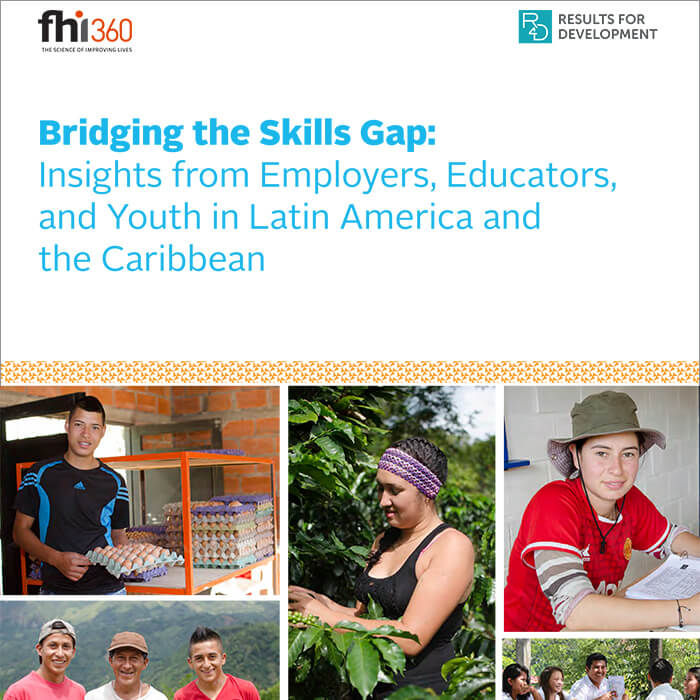Washington, D.C. — October 13, 2017 — Results for Development (R4D) and FHI 360 have released a new report that explores the fundamental question of why 20 million young people (ages 15–24) in Latin America and the Caribbean (LAC) are neither working nor in school. In particular, the report explores current trends in the school-to-work transition in the LAC region and offers recommendations for policymakers and stakeholders on how to bridge the skills gap.
While the LAC region has made great strides recently in increasing access to secondary education, 20 percent of youth — including those who successfully completed secondary schooling — lack employability skills and struggle to find work in the formal sector. This group is often cut off from productive jobs and instead turn to informal activities, such as street trading or service bartering and even crime and violence.
Bridging the Skills Gap: Insights from Employers, Educators, and Youth in Latin America and the Caribbean draws on data collected in Colombia, the Dominican Republic and El Salvador, from more than 300 students, educators, employers and public officials. The report synthesizes findings from a 10-month investigation in the three countries, and surveys the skills needed for employability, skills that are acquired through formal education systems and innovative delivery models that promote youth employability in the region. The study is authored by Ana Florez, director of education projects for Latin America and the Caribbean at FHI 360, and Shubha Jayaram, senior program officer at R4D.
“The findings in this report highlight the importance of articulating a hierarchy of skills — in which basic cognitive, higher-order cognitive and socio-emotional skills are valued above specific technical skills — and correcting misunderstandings between employers, educators and students,” said Jayaram. “This study is also unique in that we hear from those directly in the midst of, and affected by, the school-to-work transition.”
The report also includes supply- and demand-side perspectives, and explores how employers’ needs vary by sector and whether the skills demanded can be realistically expected from secondary education graduations or whether they are more easily gained by those who completed tertiary education.
“Previous discussions on closing the skills gap have focused too narrowly on the demand side of the gap — employer interests and innovation — and de-emphasized the supply side — the influence of educators,” said Florez. “Bridging the Skills Gap goes farther, addressing both the supply and demand side of the skills gap.”
Overall, the research supports the need to more clearly integrate contextual factors (e.g., economic sector, industry and education levels) when discussing and defining the skills gap. In addition, socio-emotional skills need to be defined at the employer and school levels so that both sides are “speaking the same language,” and agree on which skills to prioritize and assess. Lastly, policymakers and other stakeholders need to consider the view of many educators and employers that secondary education alone is not enough and poses a challenge to employability. Efforts that connect general academic offerings with technical and vocational apprenticeships, along with models that bridge upper secondary and higher education, can help meet that challenge.
The report was funded by the FHI Foundation.
Click to download the report.
###
About FHI 360
FHI 360 is a nonprofit human development organization dedicated to improving lives in lasting ways by advancing integrated, locally driven solutions. Our staff includes experts in health, education, nutrition, environment, economic development, civil society, gender, youth, research, technology, communication and social marketing — a unique mix of capabilities to address today’s interrelated development challenges. FHI 360 serves more than 70 countries and all US states and territories.














